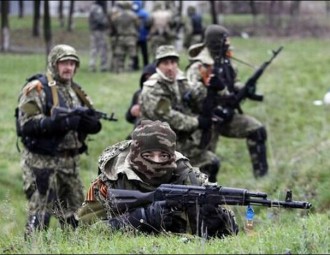Aliaksandr Alesin: The best instrument against the hybrid war is the country’s economic well-being
 naviny.by
naviny.by
Taking into account the Belarusan mentality the majority of the population will hardly openly oppose the authorities; however, the people in situation of apathy will hardly protect it.
Is the Belarusan army ready to withstand new threats in real life?
The military observant Aliaksandr Alesin answered the questions of the “EuroBelarus” Information Service.
- The military doctrine of Belarus is adjusted to the new challenges and threats; the notion of a "hybrid war" appeared. Is the Belarusian army ready to operate in the situation of a notorious hybrid war?
- This term has existed for quite a time, but Ukraine showed us an example of a large-scale hybrid war: internal problems led to the aggravation of relations between the various society classes, which was used by external forces. We have seen all the stages of a hybrid war with our own eyes: an information war, training of manpower, supplies of lethal and non-lethal weapons, and the beginning of the war itself, manifested in subversive and reconnaissance groups that later grew into a military conflict of a medium, and at times – of high intensity with the use of all weapons: aviation, armored troops, artillery ...
We have seen the development of the phenomenon of a "hybrid war". We made conclusions, but it is unlikely they are already implemented.
The military doctrine should contain primarily preventive measures against the conflict as early as during its rise. It is necessary to neutralize the conflict from the very start: to identify those, who can become soldiers of the war, to identify the channels of delivery of extremist elements, weapons, and trainers. And if it is impossible to prevent the onset of a hybrid war - a war of maneuver, a focal war, which doesn’t have the front line - the answer to it should be the same maneuver of mobile forces. Apart from mobility, they should also have armed power: reconnaissance, fire damage, and shipping. Lukashenka claimed that mobility is becoming a major feature of the modern army. I would add that special operations forces should have adequate firepower and armor protection.
- Did Belarus manage to build mobile and powerful armed forces?
- In this regard, the Belarusan army has much to do, and military-industrial complexes should help.
First of all, the army needs reconnaissance (it should be technical intelligence, and aviation that uses drones), means of mobile transfer (wheeled armored vehicles). Last year Belarus has purchased 32 BTR-82 in Russia that obviously will be given to special operations forces.
Next step is the park of drones and light attack aircrafts: we purchased four Yak-130 and we want to buy four more; they can strike guerrilla, insurgent, reconnaissance, and sabotage groups with high-precision.
Mobility of special operations forces should be enhanced with the help of the purchased 12 Mi-8 of the last modifications, which should help the forces of special operations to be in the "hot spot" at the right time, preventing the spread of conflict to neighboring areas.
The army is supplied with all of that in small quantities. But almost all military units should be turned into mobile ones: the special operations, motorized infantry, and armored forces. Of course, artillery units should also be mobile. Now the West is arming itself with the wheel artillery systems, which can accompany special operations forces.
I think that all of these objectives are incorporated in military doctrine, which aims at modernizing the Armed Forces, the Ministry of the Interior, the KGB units, the border guards forces, and military-industrial complexes.
- War is extremely expensive. Can today’s Belarus, which is experiencing a deep economic crisis, afford such modernization?
- The best remedy for a hybrid war and against its cause – a color revolution – is economic stability. The President demanded not to raise utility tariffs unreasonably, and that is the most effective instrument against the hybrid war. If the state doesn’t protect people's interests and charges its people with taxes and fees excessively, the majority of the population, taking into account our mentality, may not act openly against such state. However, the people in situation of apathy will hardly protect such government, since it doesn’t serve its economic interests. The best instrument against the hybrid war is the country’s economic well-being. Strong economy gives possibility to allocate money for they army’s rearmament and enforcement structures.
- We are considering the probability of a hybrid war in future. And what if the war starts tomorrow?..
The state of the Belarusian army is satisfactory. Why is it not good and not excellent? The technical base doesn’t fully meet the requirements of the modern warfare. If we manage to provide special operations forces with the sufficient number of powerful armored vehicles, combat helicopters, light attack aircraft, and drones, we will get a complete concentrated force, which will enable us to suppress hybrid hotbeds of war and prevent it from growing into armed conflicts of medium and high intensity.
- Lukashenka pays special attention to territorial defense, which has existed for over 10 years. How effective is it?
- In order for the territorial defense to be effective, people should be constantly trained to war, since a hybrid war can be carried out on their territory. Raiding without experience can result in great losses: reconnaissance and sabotage groups are trained and have considerable firepower, so the opposing forces must be able to neutralize them without undue loss of their own troops. But training requires money. Qualified officers who have the knowledge and teaching skills, as well the time to teach these people are needed. If it happens, then the territorial self-defense will be a real force.
-
03.01
-
07.10
-
22.09
-
17.08
-
12.08
-
30.09



























